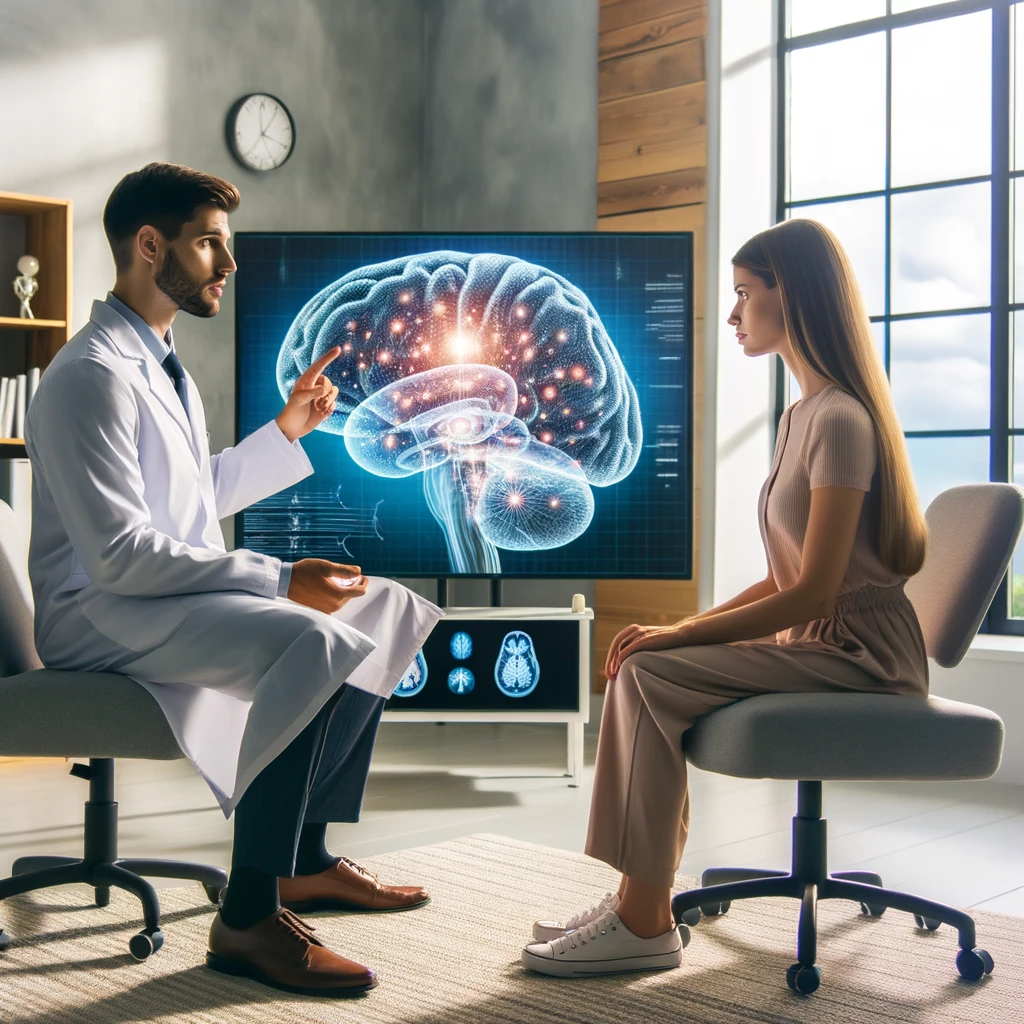From the mystical stage performances of the 18th century to the clinical therapy rooms of the 21st, hypnosis has captured the public imagination for centuries. Yet, the true science behind hypnosis, especially its neurological basis, remains something of a mystery. As we delve deeper into the inner workings of the human brain, we’re beginning to unlock some of those mysteries, revealing hypnosis as a powerful tool for understanding the mind and treating a variety of health conditions.
Table of Contents
- Unlocking the Power of the Human Mind Through Hypnosis
- Shattering the Myths: The Science Behind Hypnosis
- The Neurological Underpinnings of Hypnotic States
- Hypnosis and Brain Changes: A Glimpse into the Unconscious
- Therapeutic Applications: Utilizing Hypnosis for Healing
- Hypnosis: A Transformative Tool for the Future of Neurology
- Conclusion: The Science Behind Hypnosis
- FAQ: The Science Behind Hypnosis
- About Dr. Gary Danko
- Connect with Dr. Danko about the Science Behind Hypnosis
- Further Reading
Unlocking the Power of the Human Mind Through Hypnosis
The human mind is a complex and powerful entity, capable of extraordinary cognitive feats. Hypnosis serves as a key to unlock the potential of the mind, revealing its capacity for transformation and healing. It is a state of focused attention, enhanced suggestibility, and heightened imagination. The power of hypnosis lies in its ability to tap into the unconscious, the part of the mind that operates below our conscious awareness and houses our deepest thoughts, feelings, and behaviors.
From a neurological perspective, hypnosis is seen as a shift in the brain’s activity. It involves a unique interplay between different regions of the brain, underpinned by distinct neural networks. This neural configuration allows the mind to alter perceptions, emotions, and behaviors, demonstrating the extensive power of hypnosis.
Shattering the Myths: The Science Behind Hypnosis
Many common misconceptions about hypnosis continue to persist, creating a veil of mysticism around it. Contrary to popular belief, hypnosis is not a form of mind control, nor does it render individuals unconscious or take away their free will. Instead, hypnosis is a science-backed phenomenon, grounded in the principles of psychology and neuroscience.
Research has revealed the science behind hypnosis as a robust form of mind-body therapy, demonstrating measurable changes in the brain’s activity during a hypnotic state. These changes are marked by increased activity in the brain regions associated with attention, imagination, and suggestibility, and decreased activity in the regions linked to self-awareness and critical thinking.
The science of hypnosis also deciphers its role in modulating pain perception. Hypnosis can alters the brain’s pain-related neural processes, reducing the intensity of pain signals reaching the brain. This scientific understanding dismantles the myths surrounding hypnosis, affirming it as a legitimate therapeutic tool.
The Neurological Underpinnings of Hypnotic States
Understanding the neurological basis and the science behind hypnosis involves diving into the brain’s structure and function. Neuroimaging studies have revealed that during hypnosis, there is increased activity in the anterior cingulate cortex and the prefrontal cortex, brain regions associated with focused attention and suggestibility.
Conversely, there is decreased activity in the posterior cingulate cortex, a region involved in self-awareness and critical thinking. This suggests that during hypnosis, our attention is narrowly focused, and our capacity for critical thinking is diminished, allowing for heightened suggestibility.
Moreover, hypnosis also leads to changes in the connectivity between different brain networks. There is increased connectivity between the executive control network, responsible for high-level cognitive functions, and the salience network, involved in detecting important stimuli. These neurological insights provide a window into the unique brain states induced by hypnosis.
Hypnosis and Brain Changes: A Glimpse into the Unconscious
One of the most fascinating aspects of hypnosis is its ability to offer a glimpse into the unconscious mind. This is the part of the mind that operates below conscious awareness and influences our thoughts, feelings, and behaviors. Hypnosis can access this hidden realm, revealing its profound influence on our everyday lives.
Neurologically, hypnosis achieves this by reshaping the brain’s neural pathways. The repetitive suggestions used in hypnosis can form new connections between neurons, leading to lasting changes in thoughts, feelings, and behaviors. This aligns with the concept of neuroplasticity, the brain’s ability to rewire itself in response to experience.
Furthermore, hypnosis has been found to alter the brain’s default mode network, associated with mind-wandering and self-referential thoughts. This suggests that hypnosis can disrupt habitual thought patterns, providing a unique opportunity to explore and transform the unconscious mind.
Therapeutic Applications: Utilizing Hypnosis for Healing
The understanding of the neurological basis of hypnosis has given rise to its therapeutic applications. Hypnosis is utilized in pain management, with neuroimaging studies demonstrating its effectiveness in reducing pain perception. It modulates activity in the brain’s pain-related neural circuits, providing relief from chronic pain conditions.
Hypnosis also shows promise in treating mental health disorders, such as anxiety and depression. It can reshape the neural pathways linked to these disorders, helping individuals change negative thought patterns and improve their mental well-being.
Moreover, hypnosis is increasingly being used in the treatment of sleep disorders, with research indicating its potential in improving sleep quality and duration. By tapping into the brain’s sleep-related neural processes, hypnosis can help individuals achieve a more restful and rejuvenating sleep.
Hypnosis: A Transformative Tool for the Future of Neurology
The intersection of hypnosis and neurology holds enormous potential for the future. As we deepen our understanding of the brain and how it responds to hypnosis, we can develop more effective therapies for a range of health conditions, from chronic pain to mental health disorders.
Hypnosis also presents a unique tool for neuroscientific research, allowing scientists to explore the mind’s inner workings, including consciousness, perception, and the unconscious. By understanding these processes and the science behind hypnosis, we can gain insight into the nature of the human mind and the root causes of various neurological and psychological disorders.
Furthermore, as technology advances, techniques such as virtual reality and artificial intelligence could be integrated with hypnosis, offering exciting new directions for neurological research and therapy. The potential applications of hypnosis in neurology are vast, and as we unlock its mysteries, we will continue to enhance our ability to understand and heal the human mind.
Conclusion: The Science Behind Hypnosis
Hypnosis, once shrouded in mystery and misconception, is emerging as a powerful tool in the field of neurology. As we unravel its neurological underpinnings, we gain a deeper understanding of the human mind and its capacity for change. Far from being a parlor trick or a form of mind control, hypnosis is a legitimate therapeutic tool with a firm basis in neuroscience. It represents a transformative tool for the future, with the potential to reshape neurology and revolutionize our understanding of the human mind.
FAQ: The Science Behind Hypnosis
A: Yes, the science behind hypnosis is well-documented and supported by numerous studies. Research shows hypnosis to be an effective tool in managing various conditions. These include pain, stress, and anxiety, illustrating its therapeutic potential beyond mere placebo effects.
A: Hypnosis works by inducing a state of focused attention and increased suggestibility. During this state, the mind becomes more open to positive suggestions and changes in perception, allowing for therapeutic interventions.
A: The psychology behind hypnosis involves understanding the power of the subconscious mind. Hypnosis bypasses the critical faculties of the conscious mind to directly communicate with the subconscious. This facilitates changes in behaviors, emotions, and thoughts.
A: Hypnosis is a real psychological phenomenon with observable effects on the brain and behavior. While the therapeutic effectiveness of hypnosis can be enhanced by the placebo effect, its impact extends beyond placebo through specific mechanisms of action on the brain. The science behind hypnosis is well established.
A: Yes, people often remember what they do when hypnotized, though the level of detail can vary. Some may have vivid memories of the experience, while others may recall it as if it were a dream.
A: The success rate of hypnosis varies depending on the issue being addressed and the individual’s responsiveness to hypnosis. For conditions like smoking cessation, stress reduction, and pain management, hypnosis has shown high levels of success in many studies.
About Dr. Gary Danko
Dr. Gary Danko, PhD, is a renowned expert in Metaphysical Psychology and a Certified Hypnotherapist based in Clearwater, Florida. With a profound commitment to fostering wellness, Dr. Danko specializes in unlocking the human mind’s potential, guiding individuals towards a healthier, happier, and more fulfilling life. His holistic approach integrates spirituality, physical health, and mental well-being, offering a unique perspective on personal growth. Passionate about deep, meaningful conversations, Dr. Danko explores the intricacies of the human spirit and mind, providing insights that enlighten and inspire.
Connect with Dr. Danko about the Science Behind Hypnosis
Are you ready to embark on a journey towards a more fulfilling life? Discover the transformative power of metaphysical psychology and hypnotherapy with Dr. Gary Danko. Schedule your Free Discovery Session today and take the first step towards unlocking your true potential. Whether you’re seeking spiritual growth, mental clarity, or physical well-being, Dr. Danko’s expertise will guide you on the path to success. Don’t miss this opportunity to transform your life. Contact Dr. Danko now for your free session and experience the change you’ve been longing for!
Further Reading
Benefits of Hypnotic Regression Therapy: Science Meets Spirituality
Unveiling Hypnotherapy: A Potent Ally in Chronic Pain Relief
Practicing Mindfulness: What Is It & Why Is It Important?



Add your first comment to this post
You must be logged in to post a comment.